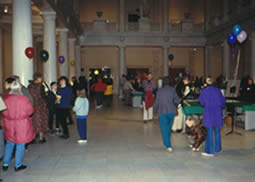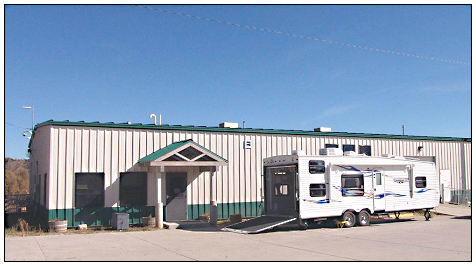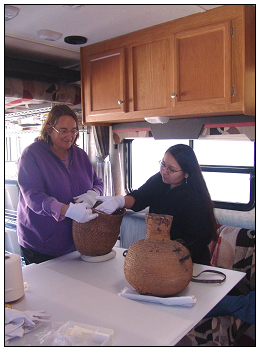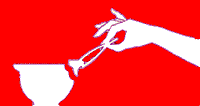Dreams Become Reality
by Helen Alten
If you have a vision and a dream, it can come true. This fact was borne home to me when the Minnesota Alliance of Local History Museums developed a statewide training program and published a book to standardize collections management throughout Minnesota's small museums. The Collection's Initiative project brought together more than 90 volunteers and contractors who wrote, edited and then simultaneously taught, using video-teleconferencing technology, six training sessions that covered an onion skin approach to collections management - creating a collections management manual and DVDs for all of the museums in the state. It was a case of the mouse that roared. A small museum organization, whose annual budget had never exceeded $4,000, received one of a handful of national Leadership Grants, and created an incredibly useful document to further the work of the trainers. (Many of our museumclasses.org trainers first worked together on that program.)
Since then I have seen other dreams become reality. Terri's Mobile Lab. Lin's Leadership Academy and Bernadette's Preservation Fair are some examples.
How do you make a dream become real? Start with an idea. What do you see as a need for your region? Next, flesh out the idea. Think carefully about all the steps needed to make it a reality. This stage may be easier if other people become involved in brainstorming sessions. Try to imagine all the contingencies or possibilities. Then consider whether you need additional funding or can make it happen without seeking funds. Often it is better to work within your current finances, starting small and building larger over time, as Bernadette Callery has done with the Preservation Fair. But sometimes you need funding to accomplish a large change, such as building a facility or purchasing a vehicle. To acquire funding, you need to develop a strong statement of need and a clear plan for rectifying that need. The clear plan includes a carefully crafted budget. This you use to shop the idea to funding organizations - large museums in your region, interested businesses, government, or private grant-makers. Perhaps the idea can pay for itself, through workshop fees or user fees. And, if you have a clear idea of what you are doing, you can ask others to donate time and expertise. This is most likely to happen if you have a good list of ways these folks will benefit from their generosity to you and your idea. Benefits can include increasing their networks, helping them further their personal philanthropic goals, and giving them an opportunity to learn a new skill.
What dreams do you have? One of our students is working on developing a national disaster response network for Greece's cultural institutions. This is a large dream that may need to be implemented in small increments.
How can you improve your region and serve the needs of all its museums? If you come up with an interesting concept, let us know. We will do our best to help you find funding and other support. |

|
|
|
Welcome to the Collections Caretaker e-Newsletter from Northern States Conservation Center. This issue is devoted to the environment that affects museums and collections. The newsletter is designed to bring you timely and helpful content that is pertinent to situations we all encounter in our museum and archives work. Feel free to let us know what topics you would like to see featured in Collections Caretaker or even contribute an article.
|
|
|
5% off two or more courses
|
|
Midwest Leadership Academy: Expand Your Leadership Capacity
Lin Nelson-Mayson
Who will replace retiring baby boomers in museums? What is needed to prepare current mid-level and emerging professionals to take leadership responsibilities? Trends indicate that many of our dedicated museum employees will be retiring in the coming decade and museum search committees will value candidates who have sought leadership training to address the challenge of the positions.
The Association of Midwest Museums (AMM) has developed a new learning intensive to enhance leadership skills in an affordable, week-long format. During the week of Sept. 18-23, participants will gather at Interlochen Center for the Arts in Traverse City, Mich., to gain greater understanding of their personal leadership styles, learn effective communication skills, improve their foundation management areas, and understand how leaders can influence individuals, institutions, and communities.The program format will feature presentations by experienced museum leaders plus daily discussions and field trips to develop the cohort's application of the topics presented.
Attendees will begin their experience with pre-conference personal development through Myers-Briggs evaluation and will extend the cohort network through regular post-conference opportunities for learning.
Northern States Conservation Center's museum management courses are good complements to this leadership academy foundation and can extend the introduction to management issues in more specific areas.
Early bird registration for the Academy will be $1,000 ($1,200 for non-members of AMM) by July 31, 2011. The fee includes all instruction and materials, lunches, refreshments and transportation to off-site activities. Students will stay at Interlochen's Stone Hotel at the AMM room rate of $79/night. For more information and to secure registration, contact Brian Bray at 314.746.4557 or see the program at www.midwestmuseums.org.
Lin Nelson-Mayson, with over 25 years of museum experience at small and large institutions, is director of the University of Minnesota's Goldstein Museum of Design. Prior to that, she was the director of ExhibitsUSA, a nonprofit exhibition touring organization that annually tours over 30 art and humanities exhibitions across the country. Ms. Nelson-Mayson has extensive experience with the planning, preparation, research and installation of exhibitions. Ms Nelson-Mayson's teaches MS 106: Exhibit Fundamentals: Ideas to Installation.
|
|
Preservation Fair at Carnegie Museum of Natural History
by Bernadette Callery
 | | The Preservation Fair brings vendors, professionals and the public together for a fun day of preservation activities. |
The Preservation Fair scheduled for Oct. 22, 2011 at the Carnegie Museum of Natural History in Pittsburgh is the latest in a series of public information events designed to bring conservators and the public together to discuss appropriate and effective methods for preserving your family treasures. Since the first Preservation Fair held in 1999, organizer Bernadette Callery, then librarian and archivist of the Carnegie Museum of Natural History and now assistant professor at the University of Pittsburgh's School of Information Sciences, has coordinated this opportunity to introduce the public to the services of local conservators, suppliers of archival quality materials, and provide basic information on proper storage and disaster recovery techniques. In addition to talking with individual conservators about specific problems, visitors to the
event can attend informal talks offered throughout the one-day event and pick up any of the many free handouts on the care of works of art on paper, documents, photographs, films, audio tapes, objects, paintings and textiles. Vendors supply catalogs and sample materials.
The 2011 Preservation Fair will include a focus on the Agents of Deterioration and how preventive measures can be applied to personal collections. Preservation students from the University of Pittsburgh Library and Information Sciences program will create the Book Dunk, a demonstration area on how to handle wet books, papers and photographs. The upcoming Fair will also include more kid-friendly activities dealing with paper making and paper repair. There are plans to include a demonstration area with overhead mirrors so that more visitors can see some basic conservation activities. See information on the 2009 Preservation Fair, for a list of previous exhibitors and events.
If you are interested in participating in the 2011 Preservation Fair, please contact Bernadette Callery at bcallery@sis.pitt.edu. There are no exhibitors fees. You are encouraged to bring before and after samples of your work for display.
|
|
Museum Training Network (MTN) Mobile Conservation Lab by Terri Schindel

Purpose. As a program of the Museum Training Network, the Mobile Conservation and Training Lab answers the collections care, conservation services, and educational programming needs of small, rural, and tribal museums, libraries and other entities managing cultural resources. The lab delivers services onsite and teaches technical skills so that all participants can increase their skill level, implement professional practices and remain competitive in the job market.
Services. Rich in cultural resources, the Rocky Mountain Region does not have a conservation laboratory that services the area. The MTN Mobile Lab offers museums, libraries, and cultural institutions a way to train both paid workers and volunteers. Additionally, the lab offers onsite care of collections and conservation services.
The lab is equipped to teach the following topics:
- Care of collections on exhibit and in storage
- Care of collections and preventive conservation techniques
- Marketing
- Fundraising and grant writing
- Planning and creating professional exhibits and utilizing the Mobile Lab equipment
- Risk Assessment and Disaster Preparedness and Response Planning (including response and drills)
A host institution using the lab chooses the training topics and hands-on projects relevant to the local situation. Using assessments, the lab helps the host institution link their needs with providers who have experience servicing and training people from small, rural, and tribal museums, libraries and cultural centers.
The lab then delivers the training to help participants increase their skill level and implement professional practices. A visit also brings follow-up trips to insure that all projects are completed to professional standards.
Schedule. Typically the lab travels fall, winter and spring with the MTN provider/trainer revisiting the site two to four times per funded project. Each training and collections project is expected to last 12 to 18 months.
 | | Terri Schindel and Melody Pickup (an intern at the Southern Ute Cultural Center and Museum in Ignacio, CO) conducting a preliminary condition examination of a basket. |
Trainers. The lab brings recognized experts to the projects. Their participation is determined by the needs and interests of the host institution. These providers are independent, stand alone businesses. They are responsible for their own insurance and travel expenses to the site.
MTN Mobile Lab Fees. The fully equipped mobile lab is rented on a per day basis. The fee includes the driver and one MTN consultant. While parked onsite at the host institution all participants may use the onboard library, reference materials, general tools, exhibit production equipment, purchase conservation/ collections care supplies, and educational exhibits. The lab and consultant/trainers are paid through a collaborative effort that may include federal, state and local grants, in-kind contributions and MTN donations. As part of their assistance, MTN helps individual institutions apply for training and project grants.
|
|
Regional Workshops
Where you can find some of our instructors this summer and fall.
Helen Alten
Terri Schindel in the MTN Mobile Lab
- June 13-14, 2011: Mannequin Making and Exhibit Case Upgrades, Wyoming Frontier Prison, Rawlins, WY.
- June 16-17, 2011: Care of Textiles and Costumes on Exhibit and in Storage, Moorcroft Historical Society and Museum, Moorcroft, WY.
- October 2011: Disaster Preparedness Planning and Response, Level II, Carbon County Museum, Rawlins, WY.
- October 2011: Collections Care/Core Curriculum, Laramie Peaks Museum, Wheatland, WY.
Gawain Weaver
Photograph Care and Identification Workshops
- June 6-9, 2011: Pittsburgh, PA
- June 20-23, 2011: Santa Fe, NM
- July 12-15, 2011: San Francisco, CA
- August 23-26, 2011: Boston, MA
- September 12-15, 2011: Normal, IL
- September 19-22, 2011: New York, NY
|
Northern States Conservation Center (NSCC) provides training, collection care, preservation and conservation treatment services. NSCC offers online museum studies classes
at www.museumclasses.org in Collections Management & Care, Museum Administration & Management, Exhibit Practices and Museum Facilities Management.
Sincerely, Helen Alten, Director
Brad Bredehoft, Sales and Technology Manager
|
|
|
|
|



